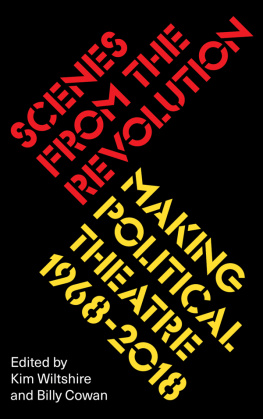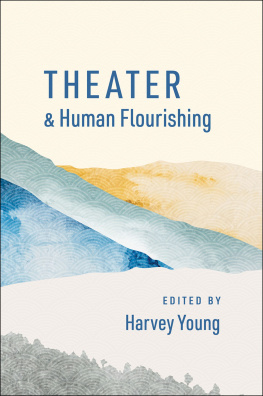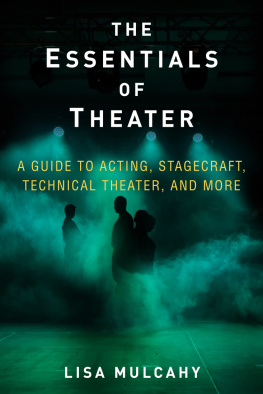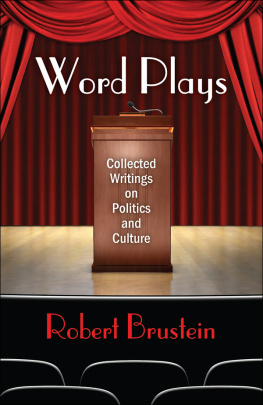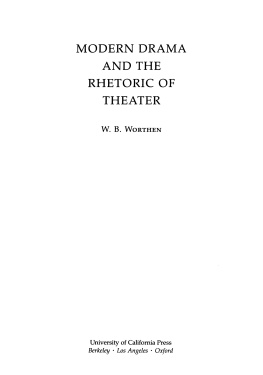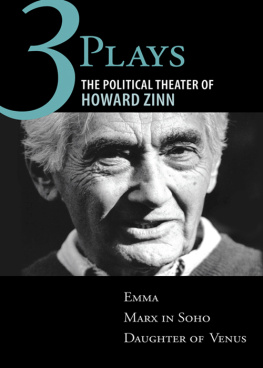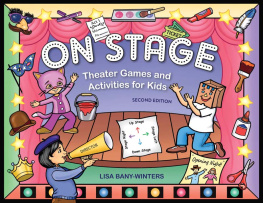Contents
Guide
Scenes from the Revolution
Scenes from the Revolution
Making Political Theatre 19682018
Edited by
Kim Wiltshire and Billy Cowan

and

First published 2018 by Pluto Press
345 Archway Road, London N6 5AA
www.plutobooks.com
and
Edge Hill University Press (EHUP)
Department of English, History and Creative Writing
St Helens Road, Ormskirk, L39 4QP
www.edgehill.ac.uk/university-press
Copyright Kim Wiltshire and Billy Cowan 2018
Excerpts from: Apartheid: The British Connection Kathleen McCreery 1978; Farewell to Erin Belgrade Theatre in Education Company, Coventry 1979; Men Don Milligan and Nol Greig 1976; Tainted Dawn Sudha Bhuchar and Kristine Landon-Smith 1999, originally published by Nick Hern Books and Tamasha Theatre Company (1999); Work to Role Sphinx (formerly the Womens Theatre Group) 1976.
The right of the individual contributors to be identified as the authors of this work has been asserted by them in accordance with the Copyright, Designs and Patents Act 1988.
British Library Cataloguing in Publication Data
A catalogue record for this book is available from the British Library
ISBN 978 0 7453 3852 1 Hardback
ISBN 978 0 7453 3851 4 Paperback
ISBN 978 1 7868 0336 8 PDF eBook
ISBN 978 1 7868 0338 2 Kindle eBook
ISBN 978 1 7868 0337 5 EPUB eBook
This book is printed on paper suitable for recycling and made from fully managed and sustained forest sources. Logging, pulping and manufacturing processes are expected to conform to the environmental standards of the country of origin.
Typeset by Stanford DTP Services, Northampton, England
Simultaneously printed in the United Kingdom and United States of America
For Jamie BC
For the Bailey Boys thanks for all the love and support KW
Contents
Introduction A Very Brief History of Political Theatre in the Twentieth Century up to 1968
Kim Wiltshire and Billy Cowan
Introduction
Kim Wiltshire
Interview with Rod Dixon (Red Ladder) and Kathleen McCreery (Red Ladder and Broadside Mobile Workers Theatre)
Kim Wiltshire
Apartheid: The British Connection (Extract), Broadside Mobile Workers Theatre
Kathleen McCreery
Contemporary Protest Theatre in South Africa
David Peimer
The Lost Art of Agitprop and the Return of Socialist Praxis
Rebecca Hillman
Introduction
Kim Wiltshire
Blood Red Roses at the Liverpool Everyman
Bob Eaton
Ways of Seeing: Class, Gender and the Universal, from Blood Red Roses to The Sum
Lizzie Nunnery
Plugging into History: Time Travel with John McGrath and 7:84
Lindsay Rodden
Introduction
Anthony Jackson
Interview with Tony Hughes (M6 Theatre Company) and Justine Themen (Belgrade TIE Company)
Billy Cowan
Everyones Got a Story to Tell and Their Own Way of Telling It
Julia Samuels (20 Stories High)
Introduction
Kim Wiltshire
Interview with Sue Parrish (Sphinx) and Mica Nava (Womens Theatre Group)
Kim Wiltshire
The Work of Open Clasp and Why Women-centred Theatre is Still Relevant Today
Catrina McHugh (MBE) and Jill Heslop
Forty Years of Women-centred Theatre-Making
Anna Hermann with Kim Wiltshire
A Conversation on Sexual Assault in Theatre
Mighty Heart and Kim Wiltshire
Introduction
Billy Cowan
Interview with Julie Parker (Drill Hall, 19812011)
Billy Cowan
Interview with Ruth McCarthy (Outburst Queer Arts Festival, Belfast)
Billy Cowan
We Who are Here Together: (Re-)making Queer Theatre
Chris Goode
Introduction
May Sumbwanyambe
A Tainted Dawn (Extract),
Sudha Bhuchar and Kristine Landon-Smith
The Personal is Always Political
Sudha Bhuchar
Pokfulam Road Productions: A Political Theatre Company?
Jingan Young
Epilogue Where Next for Political Theatre?
Billy Cowan and Kim Wiltshire
Introduction
A VERY BRIEF HISTORY OF POLITICAL THEATRE IN
THE TWENTIETH CENTURY UP TO 1968
Kim Wiltshire and Billy Cowan
There has always been theatre that is political. An argument often put forward by theatre-makers is that all theatre is political because in some form it holds a mirror up to the society in which it is created. That may to a certain extent be true, but there is of course theatre that is specifically political; theatre that looks at issues and asks the audience to think further about those issues. Theatre that uses forms and ways of working that build on what has gone before, whilst subverting ways of working that actors, directors and writers have got used to over the 2,500 years since the dithyramb first produced a theatrical scene. Political theatre companies have in the past experimented by using collaboration and cooperation, by taking socialist or communist ideals and applying these to the way they created theatre, and this concentration on form and ways of working can also be classed as political theatre, regardless of the subject matter (although very often the subject matter is also political). Then there is theatre that is made by, about and for certain groups of people those who are not male, not white, not straight. By focusing on the issues that affect these groups, the theatre-makers create political theatre through a critique of the status quo.
These are the types of theatre and the theatre-makers we are exploring in this book. These are political theatre-makers.
Over the past 50 years there have been many, many theatre-makers and theatre companies who might fit this description. Of course, not every one of these can be included in a book like this. Catherine Itzin, in 1981, attempted a survey of all the political theatre companies from 196880, whilst John Bull and George Saunders have edited a three-volume collection that surveys a range of alternative theatre companies from between 1965 to 2014, considering their work from Arts Council England documentation. These books make the brave attempt to include as many theatre companies as possible. However, when creating a book about political theatre, editors and writers have to make decisions about which companies to include and which to leave out. Questions have to be asked about a companys remit and objectives, about the body of work produced. Sometimes the size and longevity of the company, the reach and the influence of a companys work, has to be considered. To document and survey the political theatre landscape over 50 years would be a near impossible task without making some of these decisions. And as there are texts attempting this, there is no point attempting to do a similar job.
Also, it was never our intention as editors for this book simply to list a range of theatre companies who did something political once. Instead, we wanted to create scenes from political theatre past and consider what they might mean in the present. Our aim is to highlight a few companies who have made, continue to make or are beginning to make political theatre, and hear their stories, their ideas and their considerations about whether political theatre still matters, still exists or is even still relevant in the modern world.

